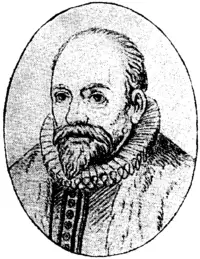Jacobus Arminius
| Western Philosophy 17th-century philosophy | |
|---|---|
 | |
| Name: Jakob Arminius | |
| Birth: October 10,1560 | |
| Death: October 19, 1609 | |
| School/tradition: Calvinism, Molinism | |
| Main interests | |
| Notable ideas | |
Jacobus Arminius (aka Jacob Arminius, James Arminius, and his Dutch name Jacob Harmenszoon) (October 10,1560–October 19, 1609), was a Dutch theologian and (from 1603) professor in theology at the University of Leiden. He wrote many books about theological problems.
Life
See also: History of Calvinist-Arminian Debate
Arminius was born at Oudewater, Utrecht. His father Herman ('Arminius/Armin' is a Latinized form of Harmenszoon, "Hermannson," Herman's son) died while Jacob was an infant, leaving his mother a widow with small children.[1] A priest, Theodorus Aemilius, adopted Jacobus and sent him to school at Utrecht. His mother was slain during the Spanish massacre of Oudewater in 1575. About that year Arminius was sent to study theology at the University of Leiden by the kindness of friends (Rudolph Snellius).
Arminius remained at Leiden from 1576 to 1582. His teachers in theology included Lambertus Danaeus, Johannes Drusius, Guillaume Feuguereius, and Johann Kolmann. Kolmann believed and taught that high Calvinism made God both a tyrant and an executioner. Under the influence of these men, Arminius studied with success and had seeds planted that would begin to develop into a theology that would later compete with the dominant Reformed theology of John Calvin. Arminius began studying under Theodore Beza at Geneva in 1582. He was called to pastor at Amsterdam and was ordained in 1588. He was reputed to be a good preacher and faithful pastor. In 1590 he married Lijsbet Reael.
Theology
Arminius is best known as the founder of the anti-Calvinistic school in Reformed Protestant theology, and thereby lent his name to a movement which resisted some of the tenets of Calvinism—Arminianism. Although he accepted the basic Calvinist attitude that fallen humans are basically depraved and dependent on God's grace for salvation, Aminius held that free will played a significant role in the process. Among the controversial points he affirmed were:
- Grace is resistible: God takes initiative in the salvation process and His grace comes to all people. This grace acts on all people to convince them of the Gospel, draw them strongly toward salvation. However, the offer of salvation through grace does not act irresistibly in a purely cause-effect, deterministic method. Contrary to Calvin, Luther, and Augustine, Aminius taught that grace can be both freely accepted and freely denied.[11]
- Man has free will to respond or resist: Free will is limited by God's sovereignty, but God allows all people the choice to accept the Gospel through faith, simultaneously allowing all men to resist.
- Election is conditional: Arminius defined election as "the decree of God by which, of Himself, from eternity, He decreed to justify in Christ, believers, and to accept them unto eternal life." God alone determines who will be saved and his determination is that all who believe Jesus through faith will be justified. Yet, those who are elected remain free to resist and thus frustrate God's will to save them.
The early Dutch followers of Arminius' teaching were also called the Remonstrants, after they issued a document containing five points of disagreement with classic Calvinism, entitled Remonstrantiœ (1610).
He became a professor of theology at Leiden in 1603, and remained there for the rest of his life. The theology of Arminianism was not fully developed during Arminius' time, but was systematized after his death and formalized in the Five articles of the Remonstrants in 1610. The works of Arminius (in Latin) were published at Leiden in 1629, and at Frankfort in 1631 and 1635. After his death the Synod of Dordrecht (1618–1619) judged his theology and its adherents anathemas.
John Wesley, founder of the Methodist movement, embraced Arminian theology and became its most prominent champion. Today, Methodism remains committed to Arminian theology, and Arminianism itself has become one of the dominant theological systems in the United States.
Notes
- ↑ Carl Bangs, Arminius; a study in the Dutch Reformation, p. 25. Nashville, Abingdon Press [1971] ISBN 0687017440 ISBN 9780687017447
External links
All links retrieved September 28, 2007.
- Jacobus Arminius - CCEL
- The Works of James Arminius, Vol. 1 - CCEL
- The Works of James Arminius, Vol. 2 - CCEL
- The Works of James Arminius, Vol. 3 - CCEL
- "Who Was Arminius?" by W. Robert Godfrey (Calvinist perspective)
- Profile page for Jacobus Arminius on Find A Grave
Credits
New World Encyclopedia writers and editors rewrote and completed the Wikipedia article in accordance with New World Encyclopedia standards. This article abides by terms of the Creative Commons CC-by-sa 3.0 License (CC-by-sa), which may be used and disseminated with proper attribution. Credit is due under the terms of this license that can reference both the New World Encyclopedia contributors and the selfless volunteer contributors of the Wikimedia Foundation. To cite this article click here for a list of acceptable citing formats.The history of earlier contributions by wikipedians is accessible to researchers here:
The history of this article since it was imported to New World Encyclopedia:
Note: Some restrictions may apply to use of individual images which are separately licensed.